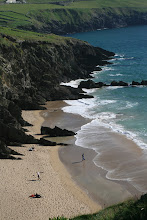 Anna Henry carried the white wooden cross bearing the name of Patsy Doherty in the 38th anniversary Bloody Sunday Memorial Mass and March on Sunday, February 14, in Sunset Park, Brooklyn.
Anna Henry carried the white wooden cross bearing the name of Patsy Doherty in the 38th anniversary Bloody Sunday Memorial Mass and March on Sunday, February 14, in Sunset Park, Brooklyn.Henry, wearing a Derry sash, is a veteran of the annual Bay Ridge Irish-American Action Association’s commemoration. It is the longest continuous observance of Bloody Sunday outside Ireland.
Youngsters, as well as seniors, carried crosses bearing the names of the 14 unarmed civil rights marchers who were killed by British paratroopers on January 30, 1972, in Derry, Northern Ireland.
The line of march began at the Irish Haven pub on Fourth Avenue at 58th Street and, led by the Clann Eireann Pipe Band, made its way to Our Lady of Perpetual Help Basilica on Fifth Avenue at 59th Street.
As curious onlookers in the multicultural neighborhood watched from the curbside, the solemn procession also paid homage to Michael Kelly, Hugh Gilmore, William McKinney, Jack Duddy, Bernard McGuigan, Gerald McKinney, William Nash, James Wray, Michael McDaid, Gerald Donaghy, John Johnston, Kevin McElhinney and John Young. All were part of a peaceful protest against internment that day in 1972, which became known as “Bloody Sunday.”
Families of the victims still await the report of the British Saville Inquiry into Bloody Sunday, which after 11 years and 2,500 witness statements, has yet to publish its findings.
Father Francis Mulvaney, C.Ss.R, celebrated Mass in the upper church at O.L.P.H. Longtime Irish advocate Father Colm Campbell, founder of the New York Irish Center, served as homilist.
Father Campbell recalled the sectarian divisions in his native Belfast, where an area such as Catholic Turf Lodge might have had 90% unemployment while in the suburbs there was “no sign of the Troubles.” He said that once Catholics gained educational advantages some such as Bernadette Devlin, Pat Finucane, and Rosemary Nelson “chose to use their talents in service to the poor and to bring justice.” Father Campbell also praised the Irish- American community here who “gave their time and skills” in the struggle for peace and justice in Ireland.
Father Campbell said that “peace with justice and reconciliation” involves “forgiveness.” He noted the latest power-sharing moves in the devolution of policing powers and said that a “change of attitudes” will come through shock, gradual change or “a third way – prayer.”
Afterward the marchers gathered back at the Irish Haven for tea and soda bread, as well as sharing of news from Derry. As in years past, the commemoration was organized by Mary Nolan and Martin Brennan.
Nolan shared a statement from the families of the victims of Bloody Sunday released at this year’s commemoration in Derry.
“The Bloody Sunday families and the wounded have faced many tests over the last 38 years,” they stated. “They say that patience is a virtue and we have shown great patience, but our patience is now wearing very thin indeed. We have had delay after delay waiting for the report of the Bloody Sunday Inquiry.
“For the past two years we have hoped that the report would be released, only to have our hopes dashed. Now we have been promised again that the report will be released in the week beginning 22nd of March. We call on everyone concerned to ensure that that date is met.”
After expressing concerns that the report will languish in British government bureaucracy, the families ended their statement by saying, “Many family members and half those wounded have since passed away without seeing justice. Don’t let this happen anymore. We now say ‘enough is enough Lord Saville, give us the report and Set the Truth Free.’”

